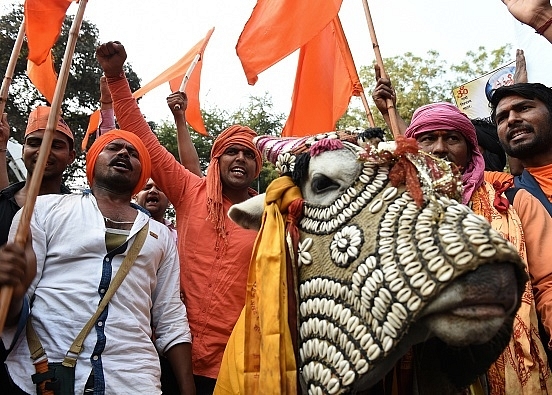
The Cow Will Defeat BJP: It’s Time For Modi & Co To Speak Against Vigilantism
If cow protection means violence against humans, it simply cannot be supported by any sane person.
The BJP and the Rashtriya Swayamsevak Sangh (RSS) have a problem on their hands. The cow protection politics that they have allowed to gain traction in various states has led to random acts of violence by vigilante groups in Gujarat, Madhya Pradesh and Haryana, among other places, against Dalits and Muslims. This is because Dalits have traditionally been involved in skinning dead animals; Muslims, on the other hand, have been involved in tanning and are, occasionally, also consumers of the meat.
Cow politics has now reached a stage where it will defeat its main protagonists. The BJP and RSS have the most to lose from this unsavoury development. It is, thus, time for Prime Minister Narendra Modi and RSS chief Mohan Bhagwat to realise that they are not going to win this war. They must speak out before it is too late.
The BJP’s stated purpose is “sabka saath, sabka vikas”; its unstated goal is to achieve a degree of Hindu vote consolidation under its political banner. How is this going to happen if a large section of Dalits is going to be alienated by cow politics and the accompanying freelance violence? And if “sabka saath, sabka vikas” is part of the slogan, how can Muslims be left out of the equation? The BJP’s worst fear should be to enable a Dalit-Muslim political consolidation that will defeat it not just in Uttar Pradesh, but elsewhere too. Cow politics will cost the BJP dearly in terms of its political future.
The RSS’s stated goal is to unify Hindus. Can this ever happen if it allows random hooligans to beat up Dalits, who it considers to be part and parcel of Hindu society?
Even assuming cow protection is a laudable activity, how can the BJP and RSS not condemn vigilante justice where individuals and self-appointed “gau rakshak” groups take the law into their own hands? If cow protection laws are being transgressed, gau rakshaks should be filing police complaints, not beating people up.
If cow protection means violence against humans, it simply cannot be supported by any sane person.
Which brings us to the broader illogic surrounding cow protection as a standalone activity.
#1: Cows die. The carcass still has to be cleaned and used in some way, unless the idea is to cremate them like humans and collect the ash. That would be a tragic waste of resources. Ergo, the people who can ensure this – Dalits and Muslims – have to part of this process.
#2: Protecting all life has some meaning. In which case, making a case only for cows is limiting. The long-term vision should be to treat all animals and birds humanely, and reducing consumption of non-plant food. This is close to the Peta-Vegan position, and can be justified on many parameters, including reduction in global warming. Humans should increase the consumption of plant-based foods and reduce animal-based ones as a long-term goal. But this should never be forced on people.
#3: The cow is passe. It turned holy for Hindus centuries ago when it
became an economic animal – delivering benefits to humans in multiple ways,
providing milk, fuel and muscle power for farming and transport. But today’s
India has moved on; the cow belt is
moving away from the cow even faster. According to an article in BusinessLine, buffalo milk has now
overtaken cow milk 55:45 in India. And the cow belt has become buffalo country.
Buffaloes constituted around 35 percent of the country’s bovine herd, but in
Haryana, Punjab, Uttar Pradesh and Gujarat the buffalo proportions range from
50-80 percent. Buffalo shares were lowest in places where there is no beef ban:
Kerala, West Bengal, and the north-east (under 5 percent). The cow-belt has
been at the forefront of abandoning its preference for cows as economics
dictates this change.
#4: Any ban on cow slaughter – around 20 states have such laws – makes sense only if this can be enforced by the law. With state capacity weak, monitoring this ban is impossible in almost any Indian state, within or without the cow-turned-buffalo belt. When the cow remains purely a sacred animal, fewer people want to own it.
The solution is obvious: cow protection should be a private and group activity, and the various cow protection laws need to be scrapped. The people of India have slowly let go of the cow; it is only our politicians who are clinging to its tail.
Cow vigilantism and violence in the name of the cow is counter-productive even for those who are wedded to the idea.